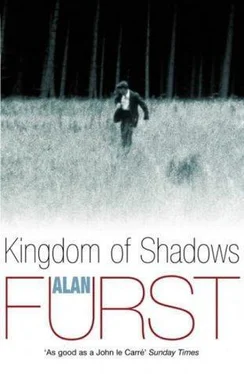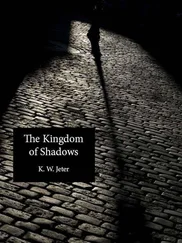Alan Furst - Kingdom of Shadows
Здесь есть возможность читать онлайн «Alan Furst - Kingdom of Shadows» весь текст электронной книги совершенно бесплатно (целиком полную версию без сокращений). В некоторых случаях можно слушать аудио, скачать через торрент в формате fb2 и присутствует краткое содержание. Жанр: Шпионский детектив, на английском языке. Описание произведения, (предисловие) а так же отзывы посетителей доступны на портале библиотеки ЛибКат.
- Название:Kingdom of Shadows
- Автор:
- Жанр:
- Год:неизвестен
- ISBN:нет данных
- Рейтинг книги:5 / 5. Голосов: 1
-
Избранное:Добавить в избранное
- Отзывы:
-
Ваша оценка:
- 100
- 1
- 2
- 3
- 4
- 5
Kingdom of Shadows: краткое содержание, описание и аннотация
Предлагаем к чтению аннотацию, описание, краткое содержание или предисловие (зависит от того, что написал сам автор книги «Kingdom of Shadows»). Если вы не нашли необходимую информацию о книге — напишите в комментариях, мы постараемся отыскать её.
Kingdom of Shadows — читать онлайн бесплатно полную книгу (весь текст) целиком
Ниже представлен текст книги, разбитый по страницам. Система сохранения места последней прочитанной страницы, позволяет с удобством читать онлайн бесплатно книгу «Kingdom of Shadows», без необходимости каждый раз заново искать на чём Вы остановились. Поставьте закладку, и сможете в любой момент перейти на страницу, на которой закончили чтение.
Интервал:
Закладка:
And, please, for what purpose?
For a social engagement.
Not for, business.
Non, monsieur l’inspecteur.
Very well, would he be so good as to wait in the reception ?
Morath sat there, the lawyer part of his mind churning away. Twenty minutes. Thirty. Bastards.
Then the inspector, Morath’s papers in his hand. Thank you, monsieur, there will be no further questions. At this time. A long instant, then, “Vos papiers, monsieur.”
Polanyi looked like he hadn’t slept. Rolled his eyes when he heard the story. Lord, why me. They met that afternoon, in the office of an elegant shop on the rue de la Paix that sold men’s accessories. Polanyi spoke to the owner, exquisitely dressed and barbered, in Hungarian. “May we have the use of your office, Kovacs Uhr, for a little while?” The man nodded eagerly, wrung his hands, there was fear in his eyes. Morath didn’t like it.
“I don’t believe they will pursue this,” Polanyi said.
“Can they extradite me to Roumania?”
“They can, of course, but they won’t. A trial, the newspapers, that’s not what they want. Two things I would suggest to you: First of all, don’t worry about it; second of all, don’t go to Roumania.”
Morath stubbed out a cigarette in the ashtray.
“Of course you are aware that relations between France and Roumania have always been important to both governments. French companies hold concessions in the Roumanian oil fields at Ploesti. So, you have to be careful.”
Polanyi paused for a moment, then said, “Now, as long as we’re here, I need to ask you a question. I have a letter from Hrubal, who wonders if I would find out from you what became of Vilmos, his chief groom, who never returned from escorting you to the Cluj railroad station.”
“Obviously they killed him.”
“Did they? Perhaps he simply ran away.”
“It’s possible. Does Hrubal know that his money vanished?”
“No. And he never will. I had to go to Voyschinkowsky who, without anything like a real explanation, agreed to make it good. So Prince Hrubal’s contribution to the national committee will be made in his name.”
Morath sighed. “Christ, it never ends,” he said.
“It’s the times we live in, Nicholas. Cold comfort, I know, but it’s been worse in the past. In any event, I don’t want you losing sleep over any of this. As long as I’m here to protect you, you’re reasonably safe.”
To follow the art dealer’s instructions, Morath had to go to the Cafe Madine that morning, but he went first of all to the office. Which he found silent and deserted-he was too early. Then, suddenly, a swirl of activity. Mary Day with an apprentice copywriter, Mary Day with Leon, the artist, Mary Day talking to Courtmain through his open door. In a white, angelic sweater, she glanced at him as he hurried past like a man who actually had something to do. Morath retreated to his office, looked at his watch, came out, went back in. Finally, she was alone at her desk, head in hands over five words typed on a sheet of yellow paper. “Mary,” he said.
She looked up. “Hello,” she said. Where have you been?
“I tried to call, last night, I couldn’t find your number.”
“Oh that’s a long story,” she said. “The apartment is actually …” She looked around. People everywhere. “Damn, I’m out of pencils.”
She rose brusquely and he followed her to the supply room, a large closet. He pulled the door closed behind them. “Here it is,” she said, writing it down.
“I want to see you.”
She handed him a slip of paper, then kissed him. He put his arms around her, held her for a moment, inhaled her perfume. “Tomorrow night?” she said.
Morath calculated. “By ten, I think.”
“There’s a cafe on the corner of the rue Guisarde.” She pressed her hand against the side of his face, then grabbed a handful of pencils. “Can’t get caught mugging in the supply room,” she said, laughing.
He followed her swinging skirt down the hall until she disappeared into the bookkeeper’s office, looking back over her shoulder as she closed the door.
At the Cafe Madine, Morath stood at the counter and had his usual coffee. Twenty minutes later-somebody, somewhere was watching, he decided-the woman showed up. She ignored Morath, sat at a table by the wall, read her copy of Le Temps.
So then, Antwerp. He went to see Boris Balki at the nightclub.
“Still at it?” Balki said, pouring two Polish vodkas.
“I guess I am,” Morath said.
“Well, I should say thank you.” Balki raised his glass in a silent toast and drank the vodka. “My friend Rashkow’s out of prison. They brought him his clothes in the middle of the night, took him to the back gate, gave him a good kick in the ass, and told him not to come back.”
“I’m glad I could help.”
“Poor little Rashkow,” Balki said.
“I need to go up to Antwerp,” Morath said. “I’m hoping you’ll come with me.”
“Antwerp.”
“We’ll need a car.”
At dawn, Morath stamped his feet to keep warm and curled into his overcoat, waiting in a white fog by the entry to the Palais Royal Metro station. A splendid car, Morath thought. It came, very slowly, up the rue Saint-Honore, a 201 Peugeot, ten years old, painted deep forest-green and glowing with polish and affection.
They drove north, following lines of trucks, into Saint-Denis. Morath directed Balki through a maze of winding streets to a park behind a church where, working hard at the reluctant latches, they took out the backseat. “Please, Morath,” Balki said. “Don’t hurt anything. This is somebody’s life, this car.” He wore a stiff brown suit, white shirt, no tie, and a peaked cap-a bartender on his day off.
Morath opened his valise and stuffed thick packets of pengo under the wire coils in the seat. Balki was grim, shook his head as he saw all the money.
Route 2, headed north and east of Paris, went through Soissons and Laon, with signs for Cambrai and Amiens, the flat, weedy plain where they’d always fought the Germans. In the villages, smoke rose from the chimneys, women opened their shutters, glanced up at the sky, and put the pillows and blankets out to air. There were kids going to school, their dogs trotting along beside them, shop assistants raising the metal shutters of their shops, milkmen setting bottles on the doorsteps.
Just beyond the French town of Bettignies, the Belgian police at the border post were busy smoking and leaning against their shed and couldn’t be bothered looking at the Peugeot as it drove past.
“Half done,” Balki said, relief in his voice.
“No, that’s it,” Morath said as the shed disappeared in the mirror. “Once we get to Antwerp, we’re tourists. Probably I should’ve just taken the train.”
Balki shrugged. “Well, you never know.”
They turned off the road, drove out into the farmland, and put the money back in the valise.
It was slow going through Brussels, they stopped for eels and frites in a bar on the outskirts, then drove along the Schelde River into Antwerp. They could hear a foghorn in the distance as a freighter worked its way out into the harbor. The diamond district was on Van Eycklei Street, in a luxurious neighborhood by a triangular park. “I’ll walk from here,” Morath said. Balki pulled over, wincing as a tire scraped against the curb.
“Shabet? Two stalls down,” they told him. He’d found the diamond exchange on Pelikaanstraat-long tables of diamond brokers, with the cutters’ offices on the floor above. The Shabet he found was in his thirties, balding and worried. “I think you’d better see my uncle,” he said. Morath waited by the table while a phone call was made, and ten minutes later the uncle showed up. “We’ll go to my office,” he said.
Читать дальшеИнтервал:
Закладка:
Похожие книги на «Kingdom of Shadows»
Представляем Вашему вниманию похожие книги на «Kingdom of Shadows» списком для выбора. Мы отобрали схожую по названию и смыслу литературу в надежде предоставить читателям больше вариантов отыскать новые, интересные, ещё непрочитанные произведения.
Обсуждение, отзывы о книге «Kingdom of Shadows» и просто собственные мнения читателей. Оставьте ваши комментарии, напишите, что Вы думаете о произведении, его смысле или главных героях. Укажите что конкретно понравилось, а что нет, и почему Вы так считаете.












